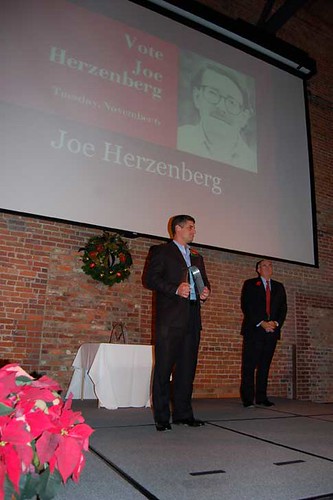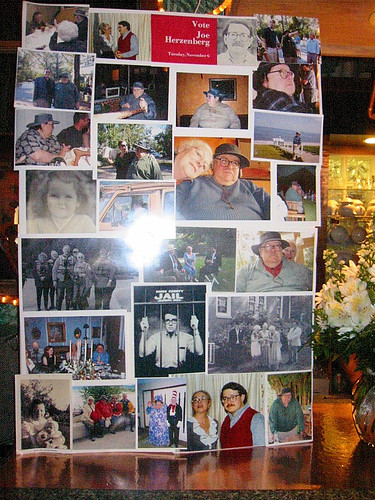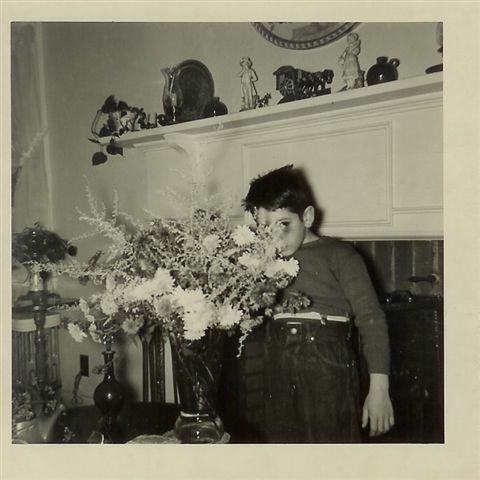The Latest Outrage, Oct. 31, 2007

Joe Herzenberg, 1989
With the death of Joe Herzenberg on Oct. 28, Chapel Hill has lost a true political hero, and one of its most caring, kind, and generous lights.
His victory in 1987 as the first openly gay man elected to public office in the South inspired countless future leaders. He championed progressive causes throughout his life, starting with his civil rights work in Mississippi during the 1960’s. Joe went to Mississippi as a Freedom Summer volunteer in 1964, and worked to register black voters who had been denied their democratic rights.
“Participating in the Freedom Summer was not a casual decision…gay Jewish Yankees from Yale were being murdered by the cops in Mississippi,” said Mark Chilton, one of Joe’s political protégés and the current mayor of Carrboro. "I remember him telling me about how the local county boards of election would refuse to let them have copies of the voter registration rolls." The volunteers sat in the election board offices and copied the voter registration lists by hand.
In 1969, Joe came to Chapel Hill as a graduate student and soon began working to elect progressives in North Carolina. Joe helped register thousands of students in Chapel Hill to vote for the 1972 elections. He served as campaign manager for Gerry Cohen, who in 1973 became the first graduate student to win a seat on the town’s Board of Aldermen.
And then Joe was defeated in his first campaign for a Board seat in 1979. Later that year, Joe was appointed to fill Cohen’s unexpired term as Alderman, when Cohen stepped down to run for Mayor. He would lose his race for re-election in 1981, the same year his partner, Lightning Brown, also ran unsuccessfully for the Board. Joe lost another bid in 1985, but he wouldn't give up. He finally returned to the (re-named) Town Council through his victorious campaign in 1987.
“Not many among us could have summoned the energy — the courage, really — for a fourth run at the town council,” said Matt Stiegler, attorney with the ACLU Capital Punishment Project. “Joe did.”

Joe on North Street in Chapel Hill, 1991
Seeking public office as a gay man in the South, at the time, was a very courageous act. Less than a year before Joe's first campaign, on November 27, 1978, Harvey Milk, the first openly gay member of the San Francisco Board of Supervisors, was assassinated in City Hall after only 11 months in office. Harvey Milk was a hero to Joe Herzenberg, and in turn, Joe became one to a new generation of progressive activists and politicians in North Carolina – gay, lesbian, and straight.

Mark Kleinschmidt, director of the Fair Trial Initiative and a current member of the Chapel Hill Town Council, credits Joe as his inspiration for entering politics.
"I just got off the phone with a friend in California," said Kleinschmidt. "My friend and I both arrived in Chapel Hill as UNC freshmen almost 20 years ago. Both of us had grown up in small North Carolina towns. Upon arrival, we learned about a man who just a year earlier had dared to honestly present himself to his community as an openly gay man and at the same time ask this same community to elect him to office. No one had successfully attempted such an audacious political act. During our conversation, my friend and I both confessed that it was the moment we heard about this guy that we knew we had found our 'home town.'"
“His election twenty years ago…changed the South,” said Mike Nelson, Orange County Commissioner and former mayor of Carrboro, who was Joe’s campaign manager in 1987 and the first openly gay mayor in N.C. “That election began a slow march, a journey, that led to Carrboro becoming the first municipality in the South to adopt domestic partnership benefits, to the governor appointing John Arrowood to the NC Court of Appeals, and to Jim Neal becoming the first openly gay man to run for U.S. Senate in North Carolina.”
I think I first met Joe in 1990 as a UNC undergrad. We shared mutual interests in Democratic politics, the local political scene, and of course, voter registration. Joe was thrilled at the idea of trying to re-awaken the sleeping student vote in Chapel Hill. He encouraged me at every turn to make it happen. With his help, we registered over 15,000 students to vote on campus during the early to mid-90’s, plus 10,000 more statewide.
We also bonded over my home state of Rhode Island. Joe spent part of almost every summer vacationing with his family on Block Island, a beautiful, unspoiled little island off the coast of Southern RI that he loved.

Like many who knew him, I have a small collection of postcards that Joe sent me over the years. His handwritten gestures followed me wherever I moved.
Joe befriended and mentored young people in this town. It was a part of who he was, like his thoughtful postcards. And he kept up his interest even after most of us graduated and drifted away from Chapel Hill.
He didn’t like e-mail or computers. Dubbed the "Mayor of Franklin Street," Joe liked walking around town and talking to people. He was old fashioned and very human.
Joe made me aware of the example set by civil rights activist Allard Lowenstein, a kindred spirit who, like Joe, had a flair for inspiring the young, worked tirelessly for progressive causes, and shared Chapel Hill ties. Both Joe and Allard Lowenstein are near the top of my list of all time heroes, and I think it’s fitting that one introduced me to the other.

When Joe believed in something, he put his energy, resources, and spirit behind it. And it was infectious. His enthusiasm and sense of the possible about doing good in local politics got me and plenty of others involved.
In 1992, Joe was a founding board member of Pride PAC, a statewide lesbian and gay political action committee now named Equality NC. Its work has helped elect a string of out and gay-friendly officials in North Carolina, including State Senator Julia Boseman, the state’s first openly lesbian legislator.
Joe found himself targeted by Jesse Helms’ hatemongering when he and his partner vocally campaigned for Gov. Jim Hunt against Helms during their hard fought 1984 Senate race. In one memorable televised debate, Helms gay-baited Hunt by thundering, “You’re supported by people like Joe Herzenberg and Lightning Brown!”
Posing as reporters for the black and gay press, right-wing Helms fanatics made and taped phone calls to gay activists around the country who were backing Hunt. Articles based on distorted excerpts from the phone calls were then published in issues of The Landmark, a conservative Chatham County newspaper.
Headlines screaming “Jim Hunt Is Sissy, Prissy, Girlish and Effeminate," and asking, “Is Jim Hunt homosexual?...Is he AC and DC?” appeared throughout 1984 in The Landmark. Funded by shadowy Helms backers, hundreds of thousands of free copies of the paper were distributed around the state, particularly in rural areas.
Joe and Lightning were the smear campaign’s N.C. poster children. According to Lightning, one caller "asked about my fund raising for Hunt. The details ended up in The Landmark right away - it was frightening." Joe and Lightning each received one of the Independent Weekly’s first Citizen Awards that year, for speaking out against “political terrorism.”
"I think gay political people elsewhere in the country think we are so brave down here having to deal with Jesse Helms," Herzenberg said. "But I've never met Jesse Helms. He doesn't live in my town. Really, life isn't so difficult here in North Carolina."
- Joe, characteristically modest, as quoted in the Chapel Hill News, April 12, 2002.

Joe in Chapel Hill, 1991
Joe crusaded to elect Democratic candidates to office, from the local to national level. He personally provided crucial early financial, organizational, and moral support for countless progressive campaigns in N.C.
One prominent example was when Joe backed former Charlotte mayor Harvey Gantt for the Democratic Senate nomination in 1990. At the time, the party establishment was lined up behind Mike Easley, then a little known Eastern N.C. prosecutor. Easley’s chief qualification among party insiders for taking on Jesse Helms seemed to be that unlike Gantt, his platform was more middle of the road than inspiring, and he wasn’t black.
And in 1998, Joe was a very early backer of John Edwards’ populist, outsider Senate campaign, despite the overwhelming support by Chapel Hill political elites for UNC Vice President D.G. Martin.
“In primaries, always vote your heart. You will have plenty of time to vote your head in the general election.”
- political advice from Joe in the 1980's, as remembered by Mark Donahue
The list of local, progressive elected officials whose campaigns Joe helped or mentored is lengthy, but some notable ones are Mike Nelson, current Orange County commissioner and former mayor of Carrboro; Ellie Kinnaird, also a former mayor of Carrboro and current N.C. State Senator; Mark Chilton, current mayor of Carrboro, and the first undergraduate student ever elected to a town council seat in Chapel Hill; and current Chapel Hill Town Council members Mark Kleinschmidt and Sally Greene.
Before coming to North Carolina, Joe served as chair of the history department at Tougaloo College, a historically black college in Mississippi.

Nov. 15, 2007 resolution honoring Joe issued by Tougaloo College
He was keenly aware of how history shapes the present day, and fought to have the town of Chapel Hill do more to recognize the contributions made by some of its overlooked citizens.
Joe urged us to remember people like Samuel Phillips, one of the state's leading Radical Republicans, who prosecuted the KKK as a federal attorney during Reconstruction and was appointed Solicitor General by President Grant.
And John Dunne, Patrick Cusick, and Quinton Baker, leaders of the local civil rights movement in the 1960’s. Their story is told in John Ehle’s long out of print book The Free Men, recently reissued in paperback, which documents the gripping events of this turbulent, too-often glossed over chapter in Chapel Hill’s past.
"At some point in the future ... there ought to be some official town notice of the three main leaders of the civil rights leaders in Chapel Hill: John Dunne, Pat Cusick and Quinton Baker. They did back in 1963 and 1964 what very few citizens of our town were willing to do, unfortunately, which was to stand up for what was right," he said. "They deserve some acknowledgment."
- Joe speaking before the Chapel Hill Town Council, as quoted in the Chapel Hill News, March 29, 2006
Looking back on the conversations we had, I think about all the places around town I remember talking or having lunch with him. I loved talking with Joe. Besides his always perceptive take and inside dope on the latest political news, he was full of personal stories - about his adventures growing up in Franklin, New Jersey (where his father owned the local drug store), living and working in Mississippi during the 60’s, and what Chapel Hill was like in the 70’s and 80’s. He was our resident wise man.
"It is very important, when running a government, to know what happened the day before yesterday or the year before last."
- Joe on Nov. 4, 1991, the day before he was re-elected to office with the highest vote total of any Chapel Hill Town Council member

Herzenberg family drug store, Franklin NJ, 1950's
I’ve been numb ever since I first heard the news yesterday morning. The last time I saw and spoke with Joe was at the grocery store. We talked for a while, first walking the aisles, then I followed him outside and said goodbye when his faithful friend and caregiver Kathie Young pulled the car around. I realized from what he told me how close he’d come to death about a year ago. But he looked much better.
I regret not seeing more of Joe over these past couple of years. I’m mad that he’s left us too early. I’m sorry he got so sick, but I remember him full of life and laughter. I’ll miss him. He devoted his life to standing up for equality and justice, and everyone who believes in these ideals will miss Joe, too.

Memorial shrine to Joe at Margaret's Cantina in Chapel Hill, November 2007. Photo by Ruby Sinreich.
Excerpts from this post have also appeared in the Carrboro Citizen and Chapel Hill News.



























